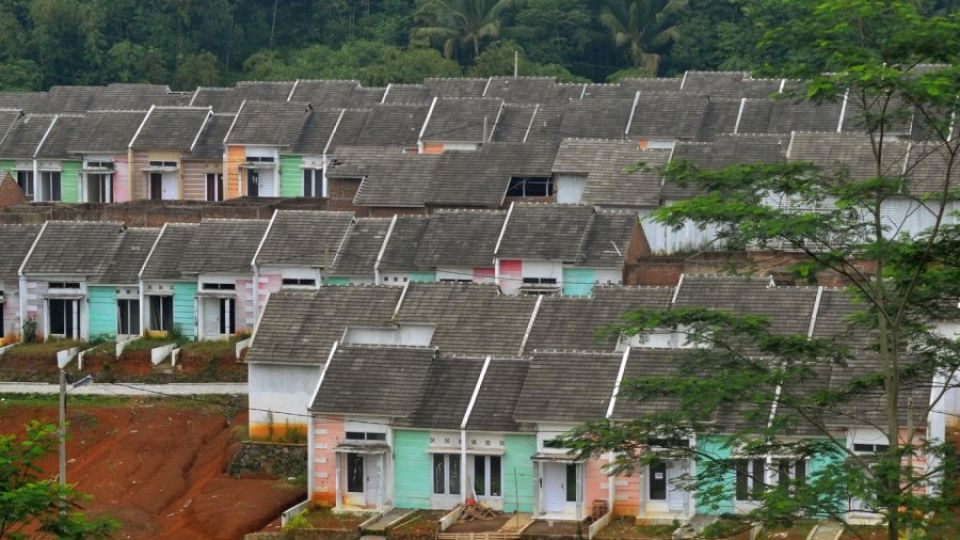February 7, 2024
JAKARTA – The government is considering extending the maximum home mortgage tenor to 35 years to provide more affordable monthly payments for lower-income households, but experts say the policy is unlikely to be much help in solving the country’s housing issues.
The plan was proposed by the Public Works and Housing Ministry in December of last year, and a pilot project is set to launch this year. Currently, the maximum legal mortgage tenor is 30 years.
The ministry is also seeking to introduce a flat interest rate throughout the repayment period.
Currently, banks often offer a mixed scheme with a flat rate for the first few years of the mortgage, followed by a floating rate in subsequent years.
“So, this new [flat rate] product is definite. All that’s left to do is [to decide] the tenor,” said Herry Trisaputra Zuna, the ministry’s public works and housing infrastructure financing director general, in December 2023, as quoted by Bisnis.
He went on to say that the plan would be incorporated into the country’s subsidized housing program for lower-income citizens.
A longer tenor could allow for smaller, less burdensome monthly payments, but it could also translate to higher interest rates given the bank’s longer period of exposure to loan risk.
The plan received some negative commentary on X, formerly known as Twitter, in which users expressed concern about the potential for higher interest rates.
“[The government] should’ve lowered [housing] prices. [We were] instead told to be IN DEBT for LONGER. This was all because of boomers and banks,” reads an X post from Jan. 19.
The government says that as of 2021, there was a “backlog” of 12.71 million homebuyers in its housing target and that the number is increasing by between 600,000 and 800,000 annually.
Most homebuyers rely on financing provided by banks and other financing institutions, and only small number can afford housing out of pocket, Bank Indonesia (BI) data shows.
Read also: Candidates promise to ease mortgages, set up agency to solve housing problem
Nailul Huda, analyst at the Center of Economic and Law Studies (CELIOS), said on Monday that rapidly increasing housing prices in the country were not being accompanied by a commensurate growth in income.
“And thus, many cannot buy houses, especially the young. Housing is unaffordable, except for subsidized housing,” Nailul told the The Jakarta Post on Monday.
He went on to say that tackling the affordability problem could be difficult unless the government managed to bring mortgage interest rates closer to the BI benchmark rate.
The BI rate has been at 6 percent for the past few months while mortgage rates as of November 2023 were hovering at 8.34 percent, Antara has reported.
“With lower interest rates, there would be no need to pay a mortgage for 35 years because the [payments] would be lower,” said Nailul.
Think tank Next Policy wrote in a January statement that high interest rates were hampering homeownership in the country. Tackling high interest rates would be crucial to ensuring the government met its homeownership targets, it said.
The think tank also suggested that the government offer a wide range of incentives and subsidies to bring down the cost of building a house.
Binus University banking industry analyst Doddy Ariefianto told the Post on Monday that extending the tenor of mortgages would also raise the risk of the loan itself given the longer borrowing period.
The average Indonesian homebuyer had about a 20-year timeframe for a mortgage, he said, as people were typically able to afford one at between 30 and 35 years old and the retirement age in the country was 55 years old.
A mortgage with a 35-year tenor could require the borrower to make payments well past his or her retirement age, he noted.
Real Estate Indonesia (REI) chairman Joko Suranto told the Post on Wednesday that property players considered the plan a “positive breakthrough” as it would provide wider access to mortgages, broadening the market.
However, he said, the scheme would barely make a dent in the recovery of the property industry, which had been hit hard by the COVID-19 pandemic.
Meanwhile, Bambang Eka Jaya, deputy chair of Real Estate Indonesia (REI) said on Monday that the policy should be accompanied by lower interest rates, as the country’s high interest rates could hamper the scheme, Kompas reported.
Risza Bambang, a financial planner at OneShildt, said on Monday that some consumers could still benefit from the scheme, specifically those able to advance their careers and income over the course of their lives.
He said this would make the payments associated with the longer-tenor mortgage more affordable, especially given the planned flat interest rate.


